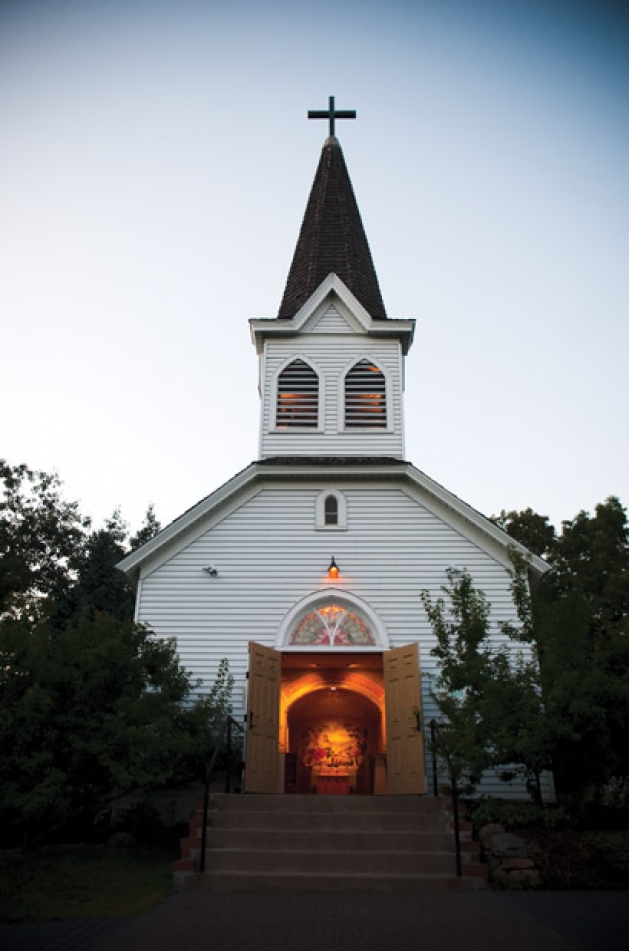
Di Liebe ist langmutig, Die Liebe ist freundlich. “Love is patient, love is kind.” And so go the golden verses that line the sanctuary of the Mount Olivet Chapel, the quaint church tucked behind century-old trees on Old Rockford Road.
The story of one of Plymouth’s oldest buildings begins in 1850—eight years before Minnesota became a state and 15 years before a post office opened in town. Missionaries began holding worship services in the Plymouth and Medicine Lake area for what was then called the German Evangelical Lutheran Church. Records were kept in German, as the founding families were new to the country, and the 10 charter members bore the surnames Sandhoff, Fitzer, Schmidt and Proehl. Prior to erecting the chapel in 1880, the congregation held meetings at the Sandhoff home on Medicine Lake.
“It’s really a little slice of the immigrant experience in Minnesota and how important that is,” says Joy Miller, director of marketing and communications and a longtime member of the church.
A walk around the perfectly maintained grounds confirms the antiquity of the space. Once home to an Indian trading post, a private school and Ivy’s Tavern, the land for the cemetery was donated by the Sandhoff family, when Christoph Sandhoff was the first to be buried there after he passed away in 1871. Other gravestones mark the lives of those lost during the influenza epidemic of 1918, early members of Mount Olivet including the Schmidt, Roggeman and Hoppenrath families, and more current members of the church.
The previous owners of the pub, Ivy Odegard and Carl and Marie Schulz, are buried in the cemetery. Karen Fischer (formerly Schulz vividly remembers her childhood growing up above Ivy’s Tavern and being a part of the deep traditions at Mount Olivet, beginning around 1945. Fischer taught Sunday school, helped to start the Luther League and had a hand in all of the renovations throughout the years.
“It made Plymouth grow,” she says of the church. “People came from quite a stretch to attend services here.”
The community soon grew too large to hold weekly services in the small chapel and parish house on the property. In 1966, the congregation broke ground for a larger building across the street, which was completed two years later. Main services are held in the larger space, but Christmas Eve and Easter Vigil services are still held by reservation at the chapel for those looking for a more traditional and intimate experience. The space is also available for small weddings, vow renewals and funerals.
Despite having gone through two major renovations in the past two decades, the history of the German chapel is vividly present: The sun beams through the beautifully restored stained glass windows, shedding light on a certificate of Confirmation displayed on the wall. Upon closer inspection, it’s written in German and bears the name Anton Henry Roggeman and the year 1910.
As has any distinguished chapel, Mount Olivet has seen much love and loss. Fischer, for example, met her husband at the Medicine Lake Community Club, and in 1958 they got married in the chapel in front of 85 guests and squeezed 600 into the parish house for the reception. The Rev. Keith H. Friese, pastor in the congregation from 1978 to 1995, is the only pastor buried on the grounds. Miller is quick to conclude that the spirit of the Rev. Friese wards off other lingering spirits. “I’m pretty sure he’s protecting it,” she says of the former pastor’s dedication to the chapel.
Pastor Keith’s admiration and respect for the past is perhaps the best summary of what the church means to the community. In an address to the congregation on a Wednesday night in July 1993, he proclaimed, “That, my friends, is what this little chapel is all about—faith, tradition, roots, simplicity—and isn’t it wonderful that right here in the middle of this high-test suburb of Plymouth, this 19th century chapel will stand surrounded by the old, old cemetery as a reminder and a symbol—a reminder of who we are, where we came from, our tradition, our roots—and that big and slick is not really any better than small and simple.”
The last verse on the wall reads “Selig lind die Gottes Wort, horen (umlaut) und bewahren. Godd mitt uns,” which translates, “Blessed are the words of God; listen and preserve them. God with us.” This little chapel is so much more than an old building; it’s a glimpse into the past.
&
12235 Old Rockford Rd.
763.559.2775






